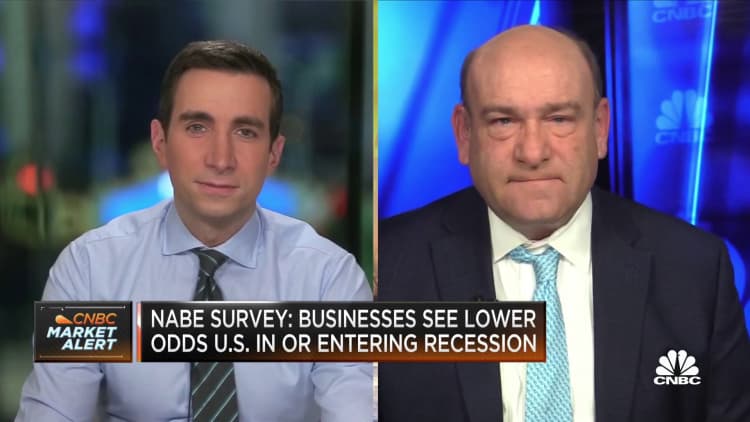Westend61 | Westend61 | Getty Images
Financial experts have long been warning of an impending economic downturn in the United States. The only question was when it would happen.
However, some firms and experts are now retracting their predictions, casting doubts on the reliability of a once-trusted indicator of recession known as the yield curve inversion.
“While it is true that the yield curve has accurately predicted several past recessions, in recent times it has been an unreliable gauge for the economy,” said Mervin Jebaraj, economic policy survey chair at the National Association for Business Economics (NABE).
In NABE’s latest survey, more than two-thirds of economists expressed at least some confidence in the Federal Reserve’s ability to steer the US economy towards a soft landing. Additionally, 20% believe the US is either already in a recession or will enter one this year.
Wall Street firms are also expressing increased optimism that a recession, which is typically defined as two consecutive quarters of decline in gross domestic product (GDP), can be avoided.
Goldman Sachs now predicts a 15% chance of a recession, down from 20%. Other major banks such as Bank of America and JPMorgan have also recently softened their recession forecasts.
According to NABE’s survey, the strong job market has prevented the US from falling into a recession.
However, the survey results also revealed a divide among economists regarding the yield curve inversion, a key indicator of recession.
The yield curve is a graphical representation of the relationship between yields on fixed-income securities and their maturity length.
When the yield curve slopes upward, with longer-term securities offering higher yields, it is considered normal. But when short-term prospects are perceived to be worse than long-term prospects, it leads to higher yields on short-term securities and a downward-sloping yield curve, known as an inverted yield curve, which is often seen as a sign of an upcoming recession.
Nobody rational would argue that the yield curve could have predicted a global pandemic and the short recession that followed it.
Mervin Jebaraj
Economic Policy Survey Chair at the National Association for Business Economics

Current recession predictions are largely based on historical patterns, but their accuracy is not guaranteed. Mervin Jebaraj argues that it would be irrational to expect the yield curve to have predicted the global pandemic and the resulting short recession.
This week, Treasury yields have risen as investors evaluate new economic data, including an increase in the unemployment rate to 3.8%. The yield on the 2-year Treasury climbed to 4.935% compared to the 10-year Treasury, which rose to 4.252%.
According to NABE’s recent survey, economists are divided on the implications of a yield curve inversion for the US economy. While 38% believe it signifies a decline in inflation without a recession, 36% predict a recession within the next 12 to 18 months. Another 14% see low long-term bond premiums and no recession.
Although a yield curve inversion has historically been a reliable recession indicator, the 2019 inversion did not accurately predict the 2020 recession. Jebaraj emphasizes that unpredictable events like a global pandemic cannot be foreseen by the yield curve.
Economists and experts are anxiously awaiting the implications of the yield curve inversion for the US economy. Barry Glassman, a certified financial planner and founder of Glassman Wealth Services, points out that analysts often claim “this time it’s different” when an inverted yield curve persists. However, he acknowledges that there are valid reasons why an inverted yield curve typically precedes a recession.
Regardless of whether a recession occurs, experts still advise individuals to prepare for a potential downturn by setting aside emergency funds to weather unexpected events or job loss.
Denial of responsibility! VigourTimes is an automatic aggregator of Global media. In each content, the hyperlink to the primary source is specified. All trademarks belong to their rightful owners, and all materials to their authors. For any complaint, please reach us at – [email protected]. We will take necessary action within 24 hours.


